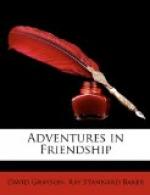The truth is,—my philosophical correspondent—I cannot formulate any theory of friendship which will cover all the conditions. I know a few things that friendship is not, and a few things that it is, but when I come to generalize upon the abstract quality I am quite at a loss for adequate language.
Friendship, it seems to me, is like happiness. She flies pursuit, she is shy, and wild, and timid, and will be best wooed by indirection. Quite unexpectedly, sometimes, as we pass in the open road, she puts her hand in ours, like a child. Friendship is neither a formality nor a mode: it is rather a life. Many and many a time I have seen Charles Baxter at work in his carpentry-shop—just working, or talking in his quiet voice, or looking around occasionally through his steel-bowed spectacles, and I have had the feeling that I should like to go over and sit on the bench near him. He literally talks me over! I even want to touch him!
It is not the substance of what we say to one another that makes us friends, nor yet the manner of saying it, nor is it what you do or I do, nor is it what I give you, or you give me, nor is it because we chance to belong to the same church, or society or party that makes us friendly. Nor is it because we entertain the same views or respond to the same emotions. All these things may serve to bring us nearer together but no one of them can of itself kindle the divine fire of friendship. A friend is one with whom we are fond of being when no business is afoot nor any entertainment contemplated. A man may well be silent with a friend. “I do not need to ask the wounded person how he feels,” says the poet, “I myself became the wounded person.”
Not all people come to friendship in the same way. Some possess a veritable genius for intimacy and will be making a dozen friends where I make one. Our Scotch Preacher is such a person. I never knew any man with a gift of intimacy so persuasive as his. He is so simple and direct that he cuts through the stoniest reserve and strikes at once upon those personal things which with all of us are so far more real than any outward interest. “Good-morning, friend,” I have heard him say to a total stranger, and within half an hour they had their heads together and were talking of things which make men cry. It is an extraordinary gift.
As for me, I confess it to be a selfish interest or curiosity which causes me to stop almost any man by the way, and to take something of what he has—because it pleases me to do so. I try to pay in coin as good as I get, but I recognize it as a lawless procedure, For the coin I give (being such as I myself secretly make) is for them sometimes only spurious metal, while what I get is for me the very treasure of the Indies. For a lift in my wagon, a drink at the door, a flying word across my fences, I have taken argosies of minted wealth!




